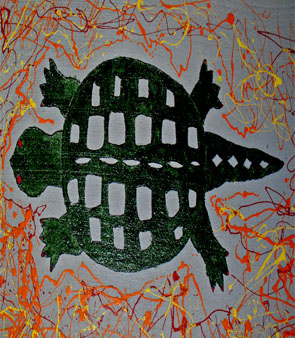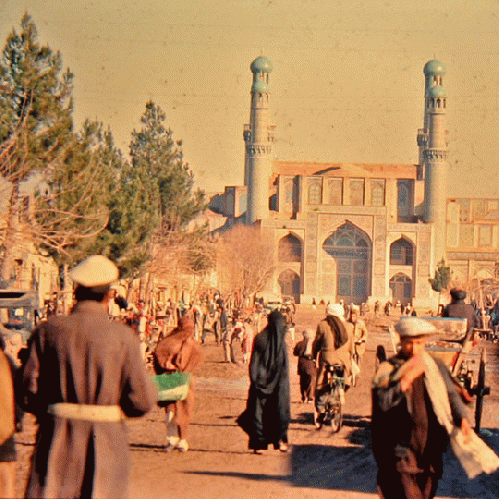This piece was reprinted by OpEd News with permission or license. It may not be reproduced in any form without permission or license from the source.
Borders, bribes, baksheesh--Afghanistan was no worse than any other country--that helped hippy hordes on the overland route to India in the seventies. Most Afghans did not see their kingdom as a rest stop on the way to Rajneesh or guru Maharishi. And most youth who crossed the Hindu Kush and Khyber Pass, a rite of passage on the road to enlightenment, had no idea what waited in Afghanistan.
Supposedly shedding shackles of European culture, and embracing a simpler lifestyle, westerners in Afghanistan encountered a different kind of flower power. Being one with nature, or living off the land--did not carry much weight with a people who lived in the moment well before recorded time. No one with any introspection could help but be humbled, or even put to shame, by the amazing Afghans, who survived in a land with nothing, yet greeted travelers with warmth, generosity, and occasional shenanigans worthy of deranged Halloween pranksters.
Nevertheless, Afghanistan was a total transformation, well before India, where callow youth, despite their conscience-seeking denial of worldly pursuit, and profuse readings of Thoreau, Gandi, or Hesse; found their faces reflected like pewter millionaires, gazing in Narcissus's pond. Afghans were the common denominator of cultural consciousness. Most were bereft of much possession; they could easily fit through the eye of the proverbial needle.
As I careened down the road to Kandahar with my British buddies, passing camels and tasseled Afghan trucks, I have to admit: my white Mercedes made me feel like teleported royalty, cruising through the desert, like an enameled icebox on wheels. The sparseness of the landscape created a contrast--magnifying the natives, and shrinking the emperor's clothes--like Captain Kirk beaming down in some black-and-white Star Trek set.
Sweeping to the south, Kandahar spread out--a vista of villas and domed buildings, with roof-top dogs, big mastiffs, every other house, and caged quail on sidewalk shops. Vendors hawked rugs, rhubarb, and Afghan coats. There were shelves with Vonnegut paperbacks, Rolling Stone eight track tapes, serrated knives with tooled wood handles, inscribed with magic rune-script, and hammered brass candlesticks and curios of all sorts. We drank sweet chai tea, ate flat bread, and sampled hashish. The memory of the pungent resin smell rekindles a crystalline Pushtun reality. We stayed a night, and kept going north to Kabul. By now, we were immersed in Afghanistan; it was like snorkeling beneath an unspoiled clear-blue surface, and swimming through a reef, where creatures of rich colors passed; only it was not blue; it was brown, with yellow and red tint. Every taste, sound, and sight, was new to our senses.
Then north--Kabul the quintessential Afghanistan--mosques with turquoise minarets--Islamic prayers raining at regular intervals; a few cracked mason government buildings worthy of rustic Route 66; and nearby marketplaces with barrels of pea-green pistachios, aphid-green raisins, and perfectly piled peaches. For a few dollars, we found a bungalow lodging.
On a step, a musician played a simple metal flute. With his modest jacket, one would not guess that he was a member of the national symphony, until his pure and classical melody transformed the air. Later that night, a group of four Afghan musicians, on fold-up chairs, performed under the stars. Haunting acoustics and rhythmic percussions filled the night. The traditional boat-shaped, six-string rubab, made of mulberry wood, left little doubt why it is called the door to the Afghan soul. Notes rise and fall, with harmonic plucks, as if they were sawing off steps, suspended in the dark, traversed by Sufi saints.
Of course, in the morning there were beggars. By the bench in the square, a small boy danced to the orchestration of his ancient grandfather. The turbaned child, probably six or seven, with a white tunic, seemed a microcosm of his bearded benefactor. Yet the boy twirled with erratic motions, his arms flew askew, and his head bobbed with spastic deviation, like some spine-damaged fish. The old man gazed up solicitously, and his fingers made twirling motions at his temple. He was signaling that the boy was insane; the look of self-pity so patronizing, as to be worthy of award in the annals of contrived falsehood. The small boy danced on like a crazed cartoon.
I had seen the same look, by a Christian priest, back down the road, in a sacred church south of the Dead Sea, outside Petra, trying to solicit holy money before I got out the door. His eyes contained no light, nor room for god, only the coined refraction of a baksheesh bishop.
For a country with nothing, however, Afghanistan, seemed quiet dense. Like rich pomegranate cake, laden with fruit and sweet meat, one bite goes far. It was time to leave, and take the Khyber Pass to Pakistan. In the morning, we drove to the border town of Torkham, above Tora Bora. The road seemed to sink, as we climbed, and the mountains rose on both sides. A car careened around the corner, coming so close, and going so fast, we shared a collective--Jesus Christ--near-death, heart-attack moment. No time to be reborn, we entered a corridor. The Torkham station was ahead. Over my shoulder, I could see my Brit buds take last tokes on their doobies, and search behind the seats for dropped roaches to toss out. I admit I had a moment of anxiety, trusting my glaze-eyed friends to police themselves, imagining the consequences of crumbled hash, if a Pakistani customs agent, in the crux of Tribal Lands, had a good nose. However, when we stopped, and the guard did examine our papers, he informed me I could take my car no further.
"Carnet," he said.
"What?"
"Carnet de Passage."
Carnet de Passage?--what kind of contrived Foreign Legion, fuzzy wuzzy, Kipling math was that? What convoluted con job were they construing now? First, custom agents try to steal my car when I enter Afghanistan; now they try to keep me from leaving? Did I look like Mr. Rube Cube? Maybe it was time to throw out Tom Paine's Age of Reason. My passengers stirred uneasily.
"Look, we're going to India." I said. I had not zig-zagged four thousand miles from Germany merely to turn back.
(Note: You can view every article as one long page if you sign up as an Advocate Member, or higher).






